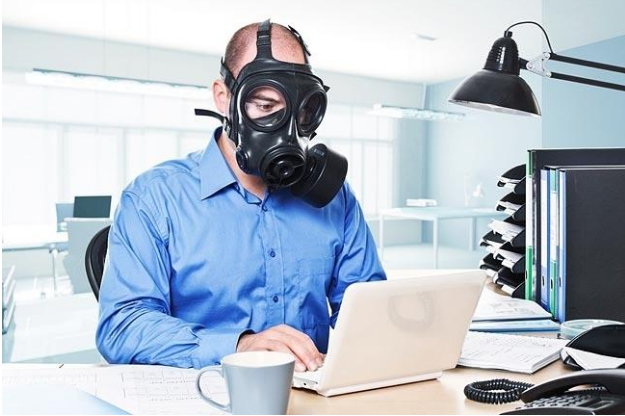Office health and safety training generally covers obvious hazards, like poor ergonomics, manual handling and eye strain. Due to the relative safety of the office environment, compared to the warehouse or building site, less obvious risks are often underestimated. Worse, some chemicals and other hazards capable of causing serious injury can go unnoticed and unmonitored.
Most office managers and small business owners are well aware of their duty to protect staff from safety risks. When drafting health and safety procedures and training, however, the focus is often on the risks office workers’ are exposed to in the course of their job, and on the environment as a ‘working office’.
The danger posed, for example, by cleaning products may be missed because the workers that a manager is supervising don’t use them. Additionally, the cleaners who do use those products only visit the office out-of-hours, after staff (and designated safety officers) have gone home.
Office cleaning chemicals may be concentrated or much stronger than equivalents used at home. If a spill or other incident occurs during office hours, prompting an employee to hunt for something to deal with the mess, those chemicals could be found and used inappropriately. Untrained use could lead to, at best, damage to office property (like desks or carpets), and at worse, serious and permanent injury.
Training needed for some equipment
Employees may be instructed not to use potentially-dangerous office equipment without training, such as guillotines, volume shredders or franking machines. Unfortunately, a worker’s familiarity with domestic cleaning products may lull them into a false sense of security, and short-circuit their health and safety training when tackling a spill, stain or other clean-up job.
A ‘clean desk’ policy can unwittingly increase the risk posed by untrained use of hazardous chemicals. Where workers are expected to clean up after themselves, it is particularly important that they are provided the means and training to do so, however obvious this might be.
Injuries arising from inappropriate use of these chemicals include chemical burns, dermatitis, lung damage and eye injury. Contact dermatitis is a common ailment affecting even trained cleaners, if they are provided with inadequate gloves or faulty personal protective equipment (PPE). The risk to an office worker without any protective gear is much higher.
Less common, but far more serious, is the potential for lung damage caused by concentrated or inappropriately-mixed chemicals. Workers have sustained severe lung injuries akin to a chlorine gas attack after inhaling gas given off by hazardous cleaning products.
Due to the absence of training in how to use chemicals stored in the office, employees are often not trained to triage injuries arising from incorrect use. The office first aider(s) should already know how to treat chemical burns generally, but some cleaning products may require non-standard treatment or an immediate hospital visit. Appropriate treatment should be printed on the chemical’s container, but that will not help if the first-aider doesn’t know to check.
Employers can be liable
An employer could easily be found liable for any injuries arising from incorrect use of cleaning chemicals in the office, even if those chemicals were used without management’s instruction or knowledge. It is the responsibility of management to ensure that all health and safety risks, both to their staff and to members of the public, are mitigated wherever reasonably possible.
As a general rule, if hazardous materials are stored in the office, appropriate direction must be given as to their use. Chris Salmon, operations director at, accident at work specialists, Quittance says, ‘The safest course is to instruct, and regularly remind, staff that they simply should not use the cleaning products.’
‘Even if the chemicals are off limits, it would be prudent to check that the chemicals used are strictly necessary. Replace them with less hazardous products where possible. Safety officers should also make a note of the appropriate treatment for each chemical, should an injury occur, and make sure all staff have access to this guidance.’
Cleaning products should always be stored in their original containers, in a secure location, and with reference to any specific storage instructions. Where possible, cleaning activity should be scheduled for a time when office staff are not present, such as evenings or weekends. Staff should also be trained how to handle any chemicals present and treat related injuries, even if workers are instructed not to use them.





